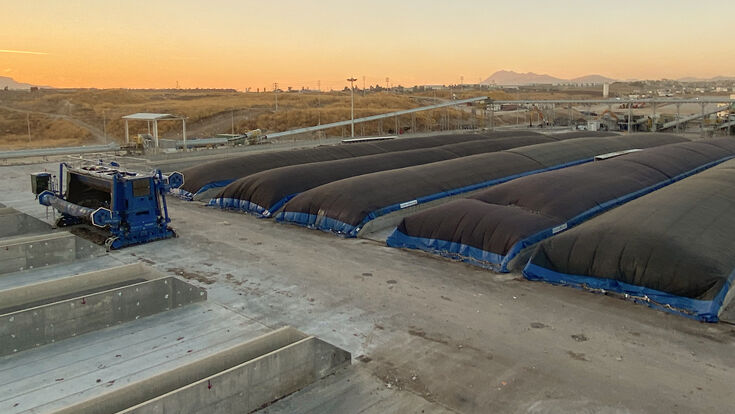Eggersmann FUEL : EcoCem expands production of alternative fuels in Sulaymaniyah

In 2020, the Eggersmann FUEL process was implemented at the Ecocem plant in Sulaymaniyah.
- © EggersmannIn 2020, Eggersmann Anlagenbau implemented the Eggersmann FUEL process at the Ecocem waste treatment plant in Sulaymaniyah. Since that time, municipal solid waste (MSW) has been processed at the facility into refuse-derived fuel (RDF) with a particularly high net calorific value in a biological-mechanical process. The RDF is used in regional cement production by the Gasin Cement Company and Bazian Cement Company. The operator has now decided to expand the plant.
A new chapter
A stationary Eggersmann TEUTON ZS 55 single-shaft shredder and four lanes for biological drying with the CONVAERO system are part of the expansion of the plant. The system is an essential component of the Eggersmann FUEL process for the production of a medium-calorific and more sustainable RDF. The expansion of the plant will allow a more flexible response to changes in the future. The plant is currently designed for a capacity of 1,100 tonnes per day.
"A particularly high-quality substitute fuel is being produced with the Eggersmann FUEL process in Sulaymaniyah, whose net calorific value can be precisely tailored to the customer’s needs over the adjusting of the drying period. This quality makes a noticeable economic difference. That convinces" summarizes Eugen Becker, Business Development Manager at Eggersmann.
Higher calorific value for greater sustainability
The Eggersmann FUEL process is characterised by the use of renewable organic material for thermal treatment. Specifically, it enables the conversion of biowaste - which is an obstacle to incineration - into a component of RDF. In many countries, municipal solid waste (MSW) is still landfilled and pollutes the environment. The production of RDF from household and commercial waste is usually just a matter of mechanically separating the high calorific value fraction from the organic fraction through shredding and separation. In the end, RDF is produced for industrial use, but often not with the desired residual moisture. The quantities of fines to be landfilled from the conventional process are much larger and still pollute the environment. Biological drying with the CONVAERO system means that the organic material itself contributes to a significant increase in the quantity and quality of the fuel.
The CONVAERO system
The Eggersmann FUEL is made possible by biological drying in lanes using a CONVAERO membrane and a BACKHUS CON turner. Since 2020, a BACKHUS CON 100 in Sulaymaniyah has been regularly turning 24 lanes with a total capacity of 57,200 m3 of waste - the expansion will add a further 10,400 m3. The BACKHUS CON 100's 10 m wide rotor mixes the material as it passes over the lanes, ensuring an even drying process and ideal distribution of the micro-organisms. It winds up the CONVAERO membrane at the front of the lane and simultaneously unwinds another one behind it. As a result, the lane is almost completely sealed, which significantly reduces emissions. The CONAVERO membrane is semi-permeable: rain is repelled while water can escape by evaporation. Odours are also retained. The track itself has a ventilation system that further accelerates the process. It does not require any external heat supply and works solely on the natural heat of the composting process. In about 20 days, the water content can be reduced from about 57% to about 20%. At the same time, the calorific value can be increased from around 2,800 kJ/kg (670 kcal/kg) to over 14,000 kJ/kg (3350 kcal/kg). After drying, the material can also be mechanically processed more efficiently: The carry-over rate is reduced. By incorporating the biomass into the fuel itself, the amount to be landfilled is significantly reduced and methane emissions at the landfill site are avoided.
A success story
Ecocem Environmental Solution Ltd. is part of the Faruk Investment Group (FIG), based in Sulaimaniya. The group has a broad range of interests in the construction industry as well as other sectors such as telecommunications, engineering and healthcare. It also produces cement for the region through the Gasin & Tasluja Cement Companies. Ecocem is therefore both a public waste management company and a fuel supplier to the cement plants. In particular, the production of cement clinker requires a constant supply of large quantities of fossil heavy fuel oil. However, the Faruk Group claims to have been able to replace ~30% of this costly fuel with the much cheaper RDF. At the same time, the remaining landfill mass was reduced by 80% thanks to the Eggersmann FUEL process. "The greatest possible substitution of conventional fuel and the greatest possible landfill reduction – these were the two goals that the Faruk Group wanted to achieve with our Eggersmann FUEL. We definitely achieved them both."

An important signal
The expansion in Sulaymaniyah is seen as a valuable signal at Eggersmann: "The planned expansion proves once again that such projects can be implemented economically anywhere in the world," explains Jan Gressmann from the Biological Waste Treatment Systems business unit at Eggersmann. He cannot understand why some Western countries still practice untreated land-filling of waste: "If the FARUK Group can successfully establish our process in Iraq, which has been weakened by war and the IS, then this should certainly not be a problem in North America, for example. Our process reduces production costs and makes a significant contribution to climate protection."


